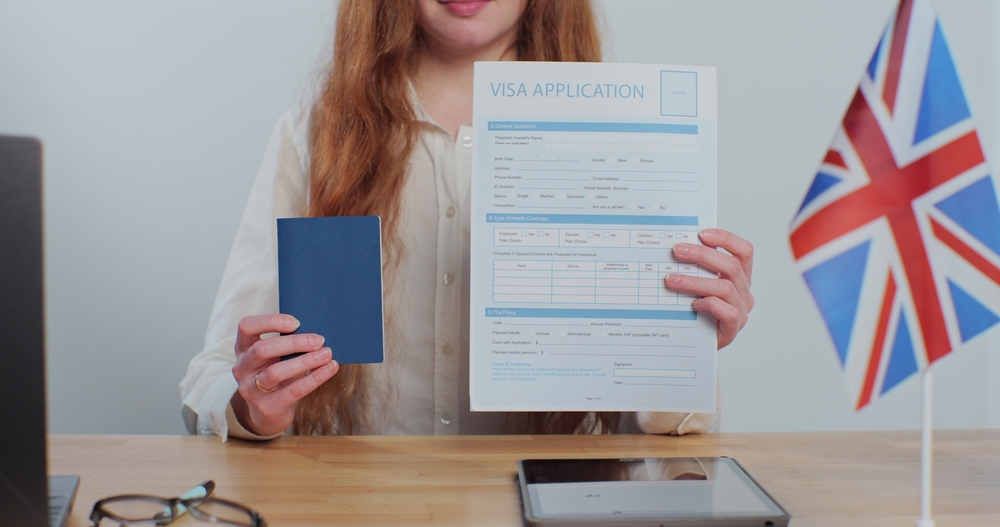From Visa to Paycheck: A Step-by-Step Guide to Getting a Job in the UK
If you’re looking to work in the UK, this guide is here to help you every step of the way. From securing a visa to getting your first paycheck, I’ll walk you through the process to simplify this journey so you don’t feel overwhelmed. I want to break down what can seem like a complicated process and give you the information you need to succeed in your job search and settle into life in the UK.
Understanding the UK Job Market
The UK job market offers many opportunities, especially for skilled foreign workers. However, it’s essential to understand the key industries currently hiring and the skills employers seek. The market is competitive, so having the right qualifications and knowing where to look for job openings is essential.

Popular Sectors Hiring Foreign Workers:
- Healthcare: There is a high demand for doctors, nurses, care assistants, and other healthcare professionals. The Health and Care Worker Visa supports healthcare workers coming to the UK.
- IT and Technology: The tech sector is booming in the UK, with roles in software development, data analysis, cybersecurity, and digital marketing being especially popular.
- Engineering: There’s a significant need for engineers, especially in fields like civil, mechanical, and electrical engineering.
- Hospitality and Tourism: Hotels, restaurants, and travel companies frequently hire foreign workers, especially during peak tourist seasons.
- Finance: The UK is a global financial hub, and jobs in banking, accounting, and financial services are always in demand.
What Employers Are Looking For:
- Skills: Employers value technical and soft skills. Technical skills include expertise in programming, engineering, or healthcare, while soft skills such as communication, teamwork, and problem-solving are also highly valued.
- Qualifications: Relevant qualifications and certifications are essential, but in many cases, experience is equally, if not more, necessary. Some jobs require UK-specific qualifications, so checking if your qualifications are recognized is essential.
- Experience: Most employers want candidates with proven expertise in their field. Be prepared to highlight your relevant experience, especially when applying for senior positions.
Common Challenges for Foreign Workers:
- Visa Restrictions: Depending on your visa type, you may be limited in the number of hours you can work or the types of jobs you can do.
- Language Barriers: English is the primary language, but the UK workforce values strong communication skills. If English isn’t your first language, it might be helpful to take language courses.
- Recognition of International Qualifications: Not all international qualifications are automatically recognized in the UK. You may need to undergo a certification process to validate your qualifications.
Read: The Shocking Truth About Moving to the UK That Most Immigrants Don’t Know
UK Work Visa Options
Before applying for jobs in the UK, you need to know which visa options are available to foreign workers. Different visas cater to other workers, so understanding which suits your skills and qualifications will make the process much smoother.
- Eligibility: To qualify, you must have a job offer from a UK employer approved by the Home Office and offer a salary that meets the minimum required amount.
- How to Apply: You can apply online through the UK government website. Your employer must also provide a Certificate of Sponsorship.
- Eligibility: This visa is for healthcare professionals, including nurses, doctors, and social workers. It offers a lower application fee and other benefits like reduced NHS fees.
- How to Apply: Similar to the Skilled Worker Visa, you need a job offer from a licensed employer and a Certificate of Sponsorship.
- Eligibility: This visa is for highly skilled workers in science, technology, engineering, and the arts. It’s for individuals recognized as leaders or emerging leaders in their field.
- How to Apply: You must have an endorsement from an approved UK body in your field, such as Tech Nation for tech professionals.
Other Visa Options:
- Youth Mobility Scheme: Allows young people from specific countries to live and work in the UK for up to two years.
- Start-Up Visa: This visa is for entrepreneurs looking to set up a business in the UK. You need to have an innovative business idea supported by an approved organization.
Employer Sponsorship:
- Many visa options require employer sponsorship, meaning you’ll need a job offer from an employer willing to sponsor your visa. The UK Home Office must approve the employer’s sponsorship of foreign workers.
How to Find Sponsorship:
- You can search for jobs that offer visa sponsorship on UK job boards like Indeed, LinkedIn, or specialist recruitment agencies. Be sure to filter job searches for “visa sponsorship” or check company websites for visa information.
Read: How to Get a Personal Loan in the UK as a New Immigrant: What You Need to Know
How to Prepare for the Job Search
Getting ready for the job search is essential for securing a job in the UK. Proper preparation, from creating a standout CV to researching potential employers, can make the process easier and increase one’s chances of landing the desired job.
CV and Cover Letter:

- Tailor Your CV: The UK job market values clear, concise, and well-structured CVs. Include your personal information, education, work experience, skills, and qualifications. Focus on achievements and responsibilities relevant to the job.
- Cover Letter: Customize your cover letter for each job application. Explain why you’re interested in the position and how your skills and experience make you an excellent fit.
Research Employers:
- Look for companies that sponsor work visas and understand the types of candidates they are looking for. Understand their culture, mission, and recent projects to tailor your applications accordingly.
Use of Job Boards:
- Some popular job boards in the UK are Indeed, LinkedIn, Monster, and Glassdoor. There are also specialized recruitment agencies like Hays or Reed that can help connect foreign workers with potential employers.
Building a Network:
- Networking is important in the UK job market. Join LinkedIn, attend industry events, and connect with UK professionals. Networking can open up job opportunities that are not posted online.
Applying for Jobs in the UK
The application process in the UK is straightforward, but it’s essential to follow the steps carefully to ensure your application stands out and meets the employer’s requirements.
Application Process:
- Apply online through job boards or company websites. Carefully follow the instructions, including submitting the required documents like your CV, cover letter, and proof of qualifications.
Visa Requirements During Application:
- Some jobs require you to mention your visa status or ability to work in the UK. Before applying, ensure your visa documents are in order.
Tailoring Applications:
- Customize your application for each job to highlight your relevant skills and experience. Use keywords from the job description to help your application pass through applicant tracking systems (ATS).
Common Interview Questions:
- Practice answers to common interview questions, such as “Why do you want to work here?” and “What can you bring to this role?” Prepare examples of how your skills have helped solve problems in your previous jobs.
UK Visa and Work Permit Process
Once you’ve secured a job offer, the next step is applying for your visa. This step-by-step guide will walk you through the visa application process.

Visa Application Process:
- You can apply online through the UK government’s official website. Before starting the application, ensure you have all the required documents ready.
Documents Needed:
- You’ll typically need a job offer letter, proof of your qualifications, passport details, and your Certificate of Sponsorship from your employer.
Health and Police Checks:
- Depending on your visa type, you may need a medical exam or police check. Be sure to complete these requirements before applying.
Visa Fees and Processing Times:
- Visa fees vary depending on the type of visa and how long you plan to stay. Processing times can also differ, so applying well in advance is vital to avoid delays.
Read: Best Budgeting Apps for New Immigrants in the UK to Manage Your Finances
Settling into Life in the UK
After securing a job and having your visa approved, the next step is adjusting to life in the UK. This section will help you through the practical aspects of settling in, from finding accommodation to understanding the cost of living.
Finding Accommodation:
- Consider rental websites such as Rightmove, Zoopla, and SpareRoom when looking for housing. The rental market can be competitive, especially in major cities like London, Manchester, and Edinburgh. It’s essential to start looking early, understand what’s included in the rent, and check if utilities are included in the deal.
- Be prepared to pay a deposit and provide references. For short-term stays, websites like Airbnb or Booking.com can also help.
Understanding the Cost of Living:
- The cost of living in the UK varies depending on the city. London is known for being expensive, with higher rent, travel, and food costs. Outside of London, the cost of living is generally more affordable.
- Key expenses include rent, groceries, utilities, transportation, and insurance. You can expect to spend between £800 and £1,500 per month, depending on your location.
Managing Finances:
- To manage your finances, you’ll need a UK bank account. Opening an account is straightforward, and many banks offer accounts for newcomers with proof of address and identification.
- Understanding the UK tax system is crucial. Income tax is deducted from your salary, and you must register with MRC for national insurance contributions.
- Create a budget to manage your spending and ensure you can cover all your expenses while saving for the future.
Cultural Adjustment:
- British culture values politeness and manners, so be respectful and considerate in professional and social settings.
- The work environment in the UK is often formal, especially in larger companies, and punctuality is highly valued.
- Socially, people tend to enjoy small talk and casual gatherings after work every day. Take time to understand the norms, but don’t feel pressured to conform immediately.
Read: The Best International Money Transfer Services for New Immigrants in the UK
Your First Day and Getting Paid
Your first day at work in the UK can be an exciting experience. Understanding workplace expectations and how payments work will help you settle in more smoothly.
Workplace Culture:
- On your first day, you will be introduced to colleagues and given an orientation on company policies, safety, and expectations. Although the office environment may vary, professionalism and respect are key values in most workplaces.
- Dress codes range from formal (business suits) to casual (smart-casual attire). It’s always best to check the company’s policy or ask beforehand.
- Communication is generally direct but polite. Be prepared for team meetings, and understand that collaboration and teamwork are valued.
Getting Paid:
- In the UK, most salaries are paid monthly, typically at the end of the month. The payment is usually made directly into your bank account.
- Tax Deductions: Income tax and National Insurance contributions are automatically deducted from your salary before you receive it. Your tax band depends on your income level.
- National Insurance: This mandatory contribution helps fund healthcare and pensions in the UK. The rate you pay depends on your income level.
Pension Schemes:
- The UK has a mandatory pension scheme, and your employer will automatically enroll you in a pension plan unless you opt-out. The scheme is designed to help workers save for retirement.
- You will contribute a percentage of your salary, which your employer will match up to a certain amount. It’s a good idea to familiarize yourself with how the pension works and review your contributions regularly.
Long-Term Career Growth in the UK
Building a long-term career in the UK is possible with the right mindset and strategy. This section analyzes how you can progress in your job, achieve permanent residency, and maintain a healthy work-life balance.
Career Progression:
- Advancing in your career involves actively seeking opportunities for skill development and performance improvement. Many companies offer internal training, workshops, and leadership development programs.
- Be proactive about seeking promotions or new job roles. Rediscuss your career goals regularly with your manager and stay updated on industry trends.
- Salary Increases: Employers in the UK often provide annual salary reviews. Demonstrating your value to the company and consistently meeting your targets can lead to higher salaries and greater responsibilities.
Permanent Residency and ILR (Indefinite Leave to Remain):
- For foreign workers, gaining Indefinite Leave to Remain (ILR) is essential for permanent residency. After living in the UK for five years on a skilled worker visa, you can apply for ILR.
- With ILR, you will have the right to live and work in the UK without time restrictions. The process for ILR involves passing an English language test, showing that you’ve been employed, and paying taxes in the UK for the required period.
Work-Life Balance:
- The UK values work-life balance. Most employees work around 37.5 hours per week, with weekends off. Time management is essential for enjoying leisure activities and holidays.
- Take advantage of public holidays, and study your surroundings. The UK offers a variety of activities, from hiking in scenic areas to enjoying the rich cultural heritage in museums and galleries.
Successfully securing a job and settling into life in the UK involves several steps, but you can thrive with the proper preparation and mindset. By understanding the job market, preparing for the visa process, and adjusting to the UK’s culture and work environment, you’ll be well on your way to a successful career.

I would like you to help me to get a job Care worker clerc or cleaner please because i juste need to work and live in canada (je voudrais saisir une opportunité)